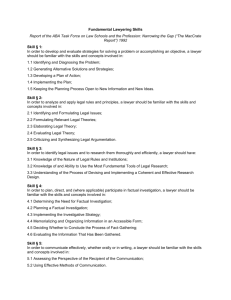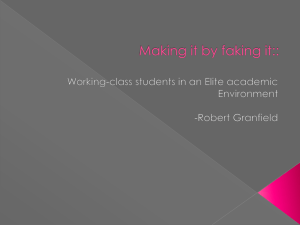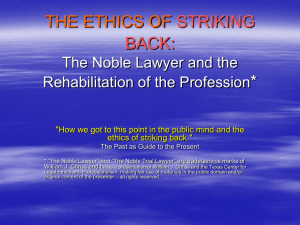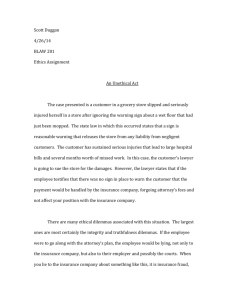27 ncac 02 RULE 4.2 COMMUNICATION WITH PERSON
advertisement
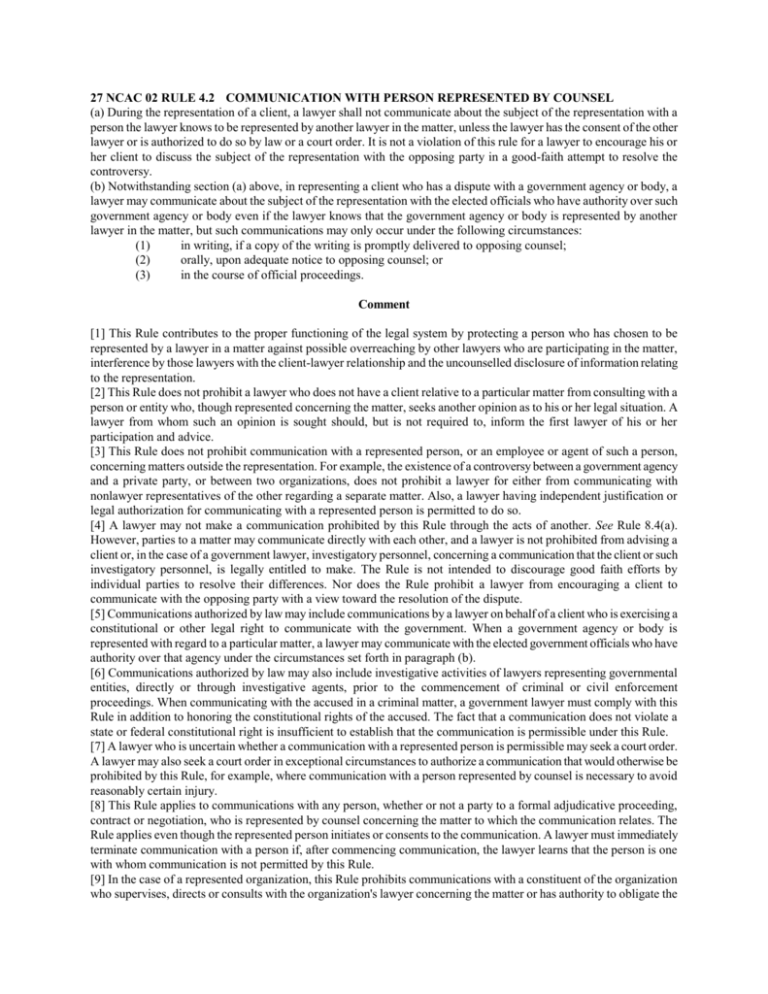
27 NCAC 02 RULE 4.2 COMMUNICATION WITH PERSON REPRESENTED BY COUNSEL (a) During the representation of a client, a lawyer shall not communicate about the subject of the representation with a person the lawyer knows to be represented by another lawyer in the matter, unless the lawyer has the consent of the other lawyer or is authorized to do so by law or a court order. It is not a violation of this rule for a lawyer to encourage his or her client to discuss the subject of the representation with the opposing party in a good-faith attempt to resolve the controversy. (b) Notwithstanding section (a) above, in representing a client who has a dispute with a government agency or body, a lawyer may communicate about the subject of the representation with the elected officials who have authority over such government agency or body even if the lawyer knows that the government agency or body is represented by another lawyer in the matter, but such communications may only occur under the following circumstances: (1) in writing, if a copy of the writing is promptly delivered to opposing counsel; (2) orally, upon adequate notice to opposing counsel; or (3) in the course of official proceedings. Comment [1] This Rule contributes to the proper functioning of the legal system by protecting a person who has chosen to be represented by a lawyer in a matter against possible overreaching by other lawyers who are participating in the matter, interference by those lawyers with the client-lawyer relationship and the uncounselled disclosure of information relating to the representation. [2] This Rule does not prohibit a lawyer who does not have a client relative to a particular matter from consulting with a person or entity who, though represented concerning the matter, seeks another opinion as to his or her legal situation. A lawyer from whom such an opinion is sought should, but is not required to, inform the first lawyer of his or her participation and advice. [3] This Rule does not prohibit communication with a represented person, or an employee or agent of such a person, concerning matters outside the representation. For example, the existence of a controversy between a government agency and a private party, or between two organizations, does not prohibit a lawyer for either from communicating with nonlawyer representatives of the other regarding a separate matter. Also, a lawyer having independent justification or legal authorization for communicating with a represented person is permitted to do so. [4] A lawyer may not make a communication prohibited by this Rule through the acts of another. See Rule 8.4(a). However, parties to a matter may communicate directly with each other, and a lawyer is not prohibited from advising a client or, in the case of a government lawyer, investigatory personnel, concerning a communication that the client or such investigatory personnel, is legally entitled to make. The Rule is not intended to discourage good faith efforts by individual parties to resolve their differences. Nor does the Rule prohibit a lawyer from encouraging a client to communicate with the opposing party with a view toward the resolution of the dispute. [5] Communications authorized by law may include communications by a lawyer on behalf of a client who is exercising a constitutional or other legal right to communicate with the government. When a government agency or body is represented with regard to a particular matter, a lawyer may communicate with the elected government officials who have authority over that agency under the circumstances set forth in paragraph (b). [6] Communications authorized by law may also include investigative activities of lawyers representing governmental entities, directly or through investigative agents, prior to the commencement of criminal or civil enforcement proceedings. When communicating with the accused in a criminal matter, a government lawyer must comply with this Rule in addition to honoring the constitutional rights of the accused. The fact that a communication does not violate a state or federal constitutional right is insufficient to establish that the communication is permissible under this Rule. [7] A lawyer who is uncertain whether a communication with a represented person is permissible may seek a court order. A lawyer may also seek a court order in exceptional circumstances to authorize a communication that would otherwise be prohibited by this Rule, for example, where communication with a person represented by counsel is necessary to avoid reasonably certain injury. [8] This Rule applies to communications with any person, whether or not a party to a formal adjudicative proceeding, contract or negotiation, who is represented by counsel concerning the matter to which the communication relates. The Rule applies even though the represented person initiates or consents to the communication. A lawyer must immediately terminate communication with a person if, after commencing communication, the lawyer learns that the person is one with whom communication is not permitted by this Rule. [9] In the case of a represented organization, this Rule prohibits communications with a constituent of the organization who supervises, directs or consults with the organization's lawyer concerning the matter or has authority to obligate the organization with respect to the matter or whose act or omission in connection with the matter may be imputed to the organization for purposes of civil or criminal liability. It also prohibits communications with any constituent of the organization, regardless of position or level of authority, who is participating or participated substantially in the legal representation of the organization in a particular matter. Consent of the organization's lawyer is not required for communication with a former constituent unless the former constituent participated substantially in the legal representation of the organization in the matter. If an employee or agent of the organization is represented in the matter by his or her own counsel, the consent by that counsel to a communication would be sufficient for purposes of this Rule. Compare Rule 3.4(f). In communicating with a current or former constituent of an organization, a lawyer must not use methods of obtaining evidence that violate the legal rights of the organization. See Rule 4.4, Comment [2]. [10] The prohibition on communications with a represented person only applies in circumstances where the lawyer knows that the person is in fact represented in the matter to be discussed. This means that the lawyer has actual knowledge of the fact of the representation; but such actual knowledge may be inferred from the circumstances. See Rule 1.0(g). Thus, the lawyer cannot evade the requirement of obtaining the consent of counsel by closing eyes to the obvious. [11] In the event the person with whom the lawyer communicates is not known to be represented by counsel in the matter, the lawyer's communications are subject to Rule 4.3. History Note: Authority G.S. 84-23; Eff. July 24, 1997; Amended Eff. February 27, 2003.

